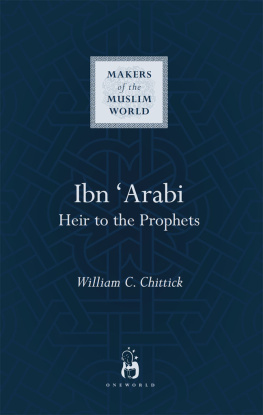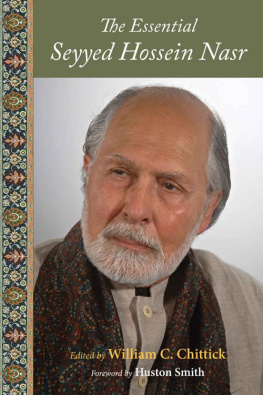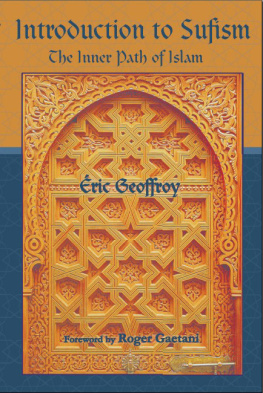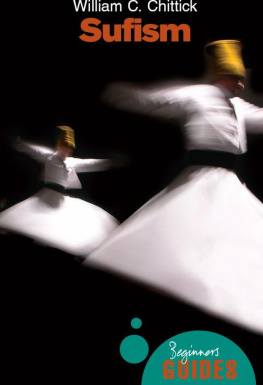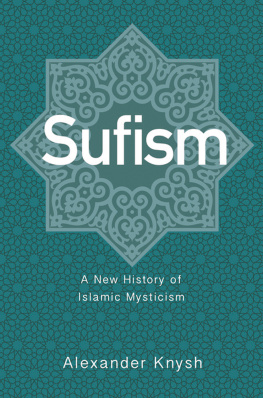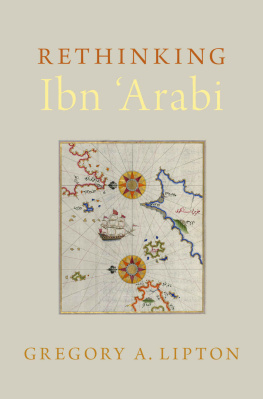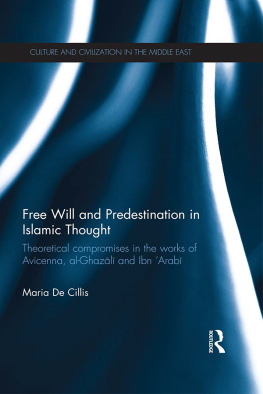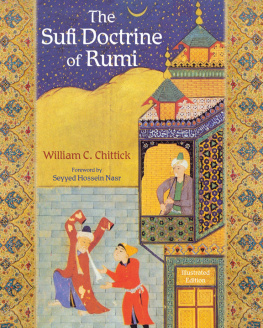
Ibn Arabi
This is a fine book which will make an excellent addition to the secondary literature on Ibn Arabi currently on the market.
Few authors working today can match William Chitticks knowledge and understanding of Ibn Arabi and it is fortunate that he has written a book that makes Ibn Arabis complex worldview available in a relatively short format.
SHAHZAD BASHIR, ASSISTANT PROFESSOR OF RELIGION, CARLETON COLLEGE, MINNESOTA
SELECTION OF TITLES IN THE MAKERS OF THE MUSLIM WORLD SERIES
Series editor: Patricia Crone,
Institute for Advanced Study, Princeton
Abd al-Malik, Chase F. Robinson
Abd al-Rahman III, Maribel Fierro
Abu Nuwas, Philip Kennedy
Ahmad ibn Hanbal, Christopher Melchert
Ahmad Riza Khan Barelwi, Usha Sanyal
Al-Mamun, Michael Cooperson
Al-Mutanabbi, Margaret Larkin
Amir Khusraw, Sunil Sharma
El Hajj Beshir Agha, Jane Hathaway
Fazlallah Astarabadi and the Hurufis, Shazad Bashir
Ibn Arabi, William C. Chittick
Ibn Fudi, Ahmad Dallal
Ikhwan al-Safa, Godefroid de Callatay
Shaykh Mufid, Tamima Bayhom-Daou
For current information and details of other books in the series, please visit www.oneworld-publications.com

IBN ARABI
Oneworld Publications
10 Bloomsbury Street
London WC1B 3SR
England
William C. Chittick 2005
This ebook edition first published 2012
All rights reserved
Copyright under Berne Convention
A CIP record for this title is available from the British Library
ISBN 978-1-85168-511-0
ISBN 978-1-78074-193-2 (ebook)
Typeset by Jayvee, India
Cover and text design by Design Deluxe
Stay up to date with the latest books, special offers, and exclusive content from Oneworld with our monthly newsletter
Sign up on our website
www.oneworld-publications.com
INTRODUCTION
B orn in Spain in 1165, Ibn Arabi is at once the most influential and the most controversial Muslim thinker to appear over the past nine hundred years. The Sufi tradition looks back upon him as the greatest master (ash-shaykh al-akbar), by which is meant that he was the foremost expositor of its teachings. Modern scholarship is rightly skeptical about grandiose titles, but there is plenty of evidence to suggest that this specific title is not out of line. On the quantitative side, Ibn Arabis massive al-Futuhat al-makkiyya (The Meccan Openings) provides more text than most prolific authors wrote in a lifetime. Manuscripts of several hundred other works are scattered in libraries, and scores of books and treatises have been published.
But greatness is not to be judged by bigness, so we clearly need to look at the contents of all those pages. Probably no one has ever read everything Ibn Arabi wrote, and few specialists would even claim to have read the whole Futuhat. Even so, reading is one thing, understanding something else. Ibn Arabi has always been considered one of the most difficult of authors. This is due to many factors, not least extraordinary erudition, consistently high level of discourse, constantly shifting perspectives, and diversity of styles. Thorough analysis and explication of a single page of the Futuhat demands many pages of Arabic text, and the task becomes much more challenging when it is a question of translation into a Western language.
One might suspect that Ibn Arabis works are difficult because he wrote unnecessarily complicated rehashes of earlier works. In fact, we are dealing with an approach to Islamic learning that is remarkably original, so much so that he has no real predecessor. Certainly, there were important authors during the previous century who also expressed Sufi teachings with theoretical sophistication, but compared even to the greatest of these, such as Ghazali, Ibn Arabi represents a radical break.
Ghazali speaks for much of the early Sufi tradition when he tells us that unveiling that is, the unmediated knowledge that God bestows on his special friends should not be set down in books (though he does not always follow his own advice). Ibn Arabi sweeps this prohibition aside and spreads out the fruit of unveiling for all to see. It should not be imagined, however, that in setting down his unveilings, witnessings, and tastings Ibn Arabi is simply providing tantalizing glimpses of the spiritual realm in the manner of a mystic visionary.
One might get the impression that Ibn Arabi was primarily a mystic by reading Stephen Hirtensteins excellent introduction to his exterior and interior life, The Unlimited Mercifier: The Spiritual Life and Thought of Ibn Arabi. Hirtenstein translates a good percentage of the autobiographical passages from Ibn Arabis studied works, and many of these speak of visions and unveilings. In fact, however, the vast majority of his writings are argued out with a rational precision that puts him into the mainstream of Islamic scholarship.
After his death in 1240, Ibn Arabis teachings quickly spread throughout the Islamic world, and they kept on spreading wherever Islam went, from Black Africa and the Balkans to Indonesia and China. The reason for this spread was certainly not that the masters of the various forms of rational discourse that shaped the Muslim elite were overawed by his mystical credentials. Quite the contrary, they were convinced by the soundness of his arguments and the breadth of his learning. They paid attention to him because he offered powerful proofs, drawn from the whole repertoire of Islamic knowledge, to demonstrate the correctness of his views. Many of these scholars adopted his basic perspectives and a good deal of his terminology, and many also criticized some of his teachings or made sweeping condemnations. But no reputable scholar could simply ignore him.
Ibn Arabis doctrines and perspectives did not have the limited, elite audience that one might expect. They also seeped down into the nooks and crannies of Islamic culture. This happened in many ways, not least through the widespread reach of the Sufi orders, which played important roles in shaping society all over the Islamic world. Several of the orders claimed him as one of their intellectual and spiritual forebears.
Ibn Arabis popularity among the Sufis should not be understood to mean that he was widely read by them. In fact, the vast majority were not scholars and did not have the requisite training to study his writings. Generally, however, those with an intellectual calling, who often ended up as guides and teachers, spoke a language that was largely fashioned by him and his immediate followers.
Ibn Arabis influence also spread through the enormously popular poetry of languages like Persian, Turkish, and Urdu. Many of the great poets were trained in Sufi learning and employed concepts and perspectives drawn from his school of thought.
Partly because of his pervasive influence and widespread name recognition, Ibn Arabi came to be targeted by reformers and modernists from the second half of the nineteenth century. He specifically and Sufism generally were chosen as convenient emblems for every shortcoming of traditional Islamic society. More recently, interest in his writings has made a remarkable comeback throughout the Islamic world, especially among young people disillusioned with the various forms of modern ideology, fundamentalism being the latest of these.
Next page
